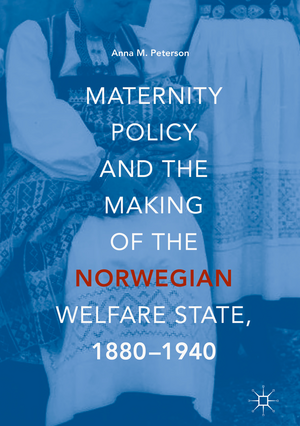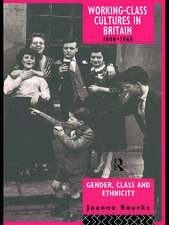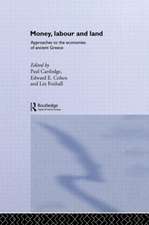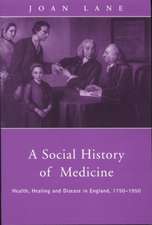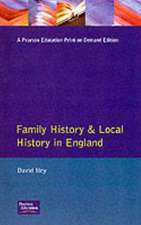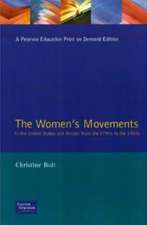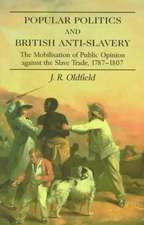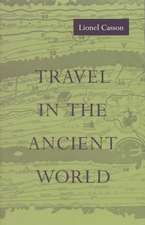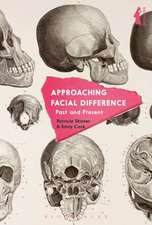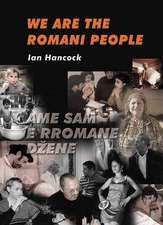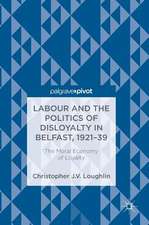Maternity Policy and the Making of the Norwegian Welfare State, 1880-1940
Autor Anna M. Petersonen Limba Engleză Hardback – 26 iun 2018
This book traces women’s influence on maternity policy in Norway from 1880-1940. Maternity policies, including maternity leave, midwifery services and public assistance for mothers, were some of the first welfare policies enacted in Norway. Feminists, midwives, and working women participated in their creation and helped transform maternity policies from a restriction to a benefit. Situating Norway within the larger European context, the book contributes to discussions of Scandinavian welfare state development and further untangles the relationship between social policy and gender equality.
The study of poor, rural women alongside urban middle-class feminists is rooted in an inclusive archival source base that speaks to the interplay between local and national welfare officials and recipients, the development and implementation of laws in diverse settings, the divergent effects maternity policies had on women, and women’s varied response.
| Toate formatele și edițiile | Preț | Express |
|---|---|---|
| Paperback (1) | 579.20 lei 6-8 săpt. | |
| Springer International Publishing – 26 ian 2019 | 579.20 lei 6-8 săpt. | |
| Hardback (1) | 640.88 lei 6-8 săpt. | |
| Springer International Publishing – 26 iun 2018 | 640.88 lei 6-8 săpt. |
Preț: 640.88 lei
Preț vechi: 753.97 lei
-15% Nou
Puncte Express: 961
Preț estimativ în valută:
122.65€ • 127.57$ • 101.25£
122.65€ • 127.57$ • 101.25£
Carte tipărită la comandă
Livrare economică 14-28 aprilie
Preluare comenzi: 021 569.72.76
Specificații
ISBN-13: 9783319754802
ISBN-10: 3319754807
Pagini: 248
Ilustrații: XIII, 221 p. 9 illus.
Dimensiuni: 148 x 210 mm
Greutate: 0.43 kg
Ediția:1st ed. 2018
Editura: Springer International Publishing
Colecția Palgrave Macmillan
Locul publicării:Cham, Switzerland
ISBN-10: 3319754807
Pagini: 248
Ilustrații: XIII, 221 p. 9 illus.
Dimensiuni: 148 x 210 mm
Greutate: 0.43 kg
Ediția:1st ed. 2018
Editura: Springer International Publishing
Colecția Palgrave Macmillan
Locul publicării:Cham, Switzerland
Cuprins
Chapter 1: Introduction.- Chapter 2: “What Nature Itself Demands:” The Development of Maternity Legislation at the End of the Nineteenth Century.- Chapter 3: “For the Health of the People:” Public Health and the Compensation of Maternity Leave in the 1910s.- Chapter 4: “Protecting Mothers and Children:” The Castbergian Children’s Laws and Maternity Assistance for Single Mothers in the 1910s.- Chapter 5: “Getting the Most Money Possible:” Women’s Responses to the Implementation of Maternity Laws, 1916-1930.- Chapter 6: “Mothers’ Freedom is the Key to Women’s Emancipation:” Feminist Efforts to Expand Maternity Legislation in the Interwar Period.- Chapter 7: Conclusion.- Index.
Notă biografică
Anna M. Peterson is Assistant Professor of History at Luther College, USA. She has published a number of articles on the history of women's rights in Norway. In 2016 she became the first historian outside of Norway to receive the Norwegian Historical Association’s award for the most innovative contribution to their journal, the Journal of Norwegian History.
Textul de pe ultima copertă
This book traces women’s influence on maternity policy in Norway from 1880-1940. Maternity policies, including maternity leave, midwifery services and public assistance for mothers, were some of the first welfare policies enacted in Norway. Feminists, midwives, and working women participated in their creation and helped transform maternity policies from a restriction to a benefit. Situating Norway within the larger European context, this book contributes to discussions of Scandinavian welfare state development and further untangles the relationship between social policy and gender equality.
This study of poor, rural women alongside urban middle-class feminists is rooted in an inclusive archival source base that speaks to the interplay between local and national welfare officials and recipients, the development and implementation of laws in diverse settings, the divergent effects maternity policies had on women, and women’s varied responses.
Caracteristici
Assesses the influence that women had on Norwegian maternity legislation from the late nineteenth to the mid-twentieth century Examines how feminists, midwives and working girls shaped maternity policy, considering the poor and rural, and the urban and middle-class Utilises previously unused sources from Norwegian regional and national archives
